|
|
|
Sort Order |
|
|
|
Items / Page
|
|
|
|
|
|
|
| Srl | Item |
| 1 |
ID:
141169


|
|
|
|
|
| Summary/Abstract |
Despite the importance of public opinion in supporting the military and their missions, little is known about how the UK public perceive their Armed Forces. This article reviews and evaluates available research and opinion poll data of public attitudes toward the UK military and situates the evidence within the civil–military gap literature. Current evidence suggests public regard for the UK Armed Forces is high despite low levels of support for the Iraq and Afghanistan missions. Public understanding of the work of the Armed Forces is limited. Nonetheless, the United Kingdom’s long history of military deployments may have given the public an “intuitive understanding” of the basic realities of the military compared with other European states. There are indications of differences in attitudes between the UK Armed Forces and wider British society, but no firm evidence that the civil–military “gap” has become a “gulf” as claimed by some military leaders.
|
|
|
|
|
|
|
|
|
|
|
|
|
|
|
|
| 2 |
ID:
109279
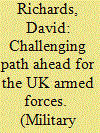

|
|
|
| 3 |
ID:
138351
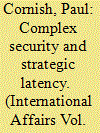

|
|
|
|
|
| Summary/Abstract |
Whichever party or parties form the next UK government, a Strategic Defence and Security Review (SDSR) is expected to begin soon after the general election in May. The review might be a ‘light touch’ exercise—little more than a reaffirmation of the SDSR produced by the coalition government in 2010. It seems more likely, however, that the review will be a lengthier, more deliberate exercise and one which might even last into 2016. For those most closely engaged in the process the challenge is more complex than that confronted by their predecessors in 2010. The international security context is more confused and contradictory; the UK's financial predicament is still grave; security threats and challenges will emerge that cannot be ignored; the population's appetite for foreign military engagement appears nevertheless to be restricted; and prevailing conditions suggest that the risk-based approach to national strategy might be proving difficult to sustain. Two key questions should be asked of the review. First, in the light of recent military experiences, what is the purpose of the United Kingdom's armed forces? Second, will SDSR 2015–16 sustain the risk-based approach to national strategy set out in 2010, and if so how convincingly? Beginning with a review of the background against which SDSR 2015–16 will be prepared, this article examines both enduring and immediate challenges to the national strategic process in the United Kingdom and concludes by arguing for strategic latency as a conceptual device which can complement, if not reinvigorate, the risk-based approach to national strategy and defence.
|
|
|
|
|
|
|
|
|
|
|
|
|
|
|
|
| 4 |
ID:
155766
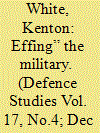

|
|
|
|
|
| Summary/Abstract |
The use of commercial business management techniques is widespread in all government departments, including the Ministry of Defence. This article examines the use of popular management techniques in the Armed Forces and argues that their application is misplaced. It looks at what the “effs” – “efficiency” and “effectiveness” – mean in the business world and to the Armed Forces. It compares the definitions both in business and the Armed Forces and finds that there are few, if any, situations where the same measurements can be applied. Whilst many management techniques are suited for business, the function of the Armed Forces and its output cannot be measured in the same way, complicated by the different metrics of “efficiency” in peace and in war. This difference may not be clearly understood by some politicians, or indeed by some senior military personnel. Using examples from some of the most popular management techniques such as “Lean” and “Agile” it is possible to see that their use might actually diminish the capabilities of the Armed Forces when it comes to performing their principal role – the use of force to achieve political objectives.
|
|
|
|
|
|
|
|
|
|
|
|
|
|
|
|
| 5 |
ID:
180505


|
|
|
|
|
| Summary/Abstract |
Integration is the latest focus for developing the UK armed forces, as well as other militaries facing similar challenges from adversaries blurring the boundaries between peace and war. Paul O’Neill argues, however, that it cannot be an end in itself. Integration needs to be relegated to and regulated by a higher purpose: adaptability.
|
|
|
|
|
|
|
|
|
|
|
|
|
|
|
|
| 6 |
ID:
104759
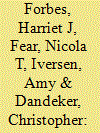

|
|
|
|
|
| Publication |
2011.
|
| Summary/Abstract |
The legacy of Gulf War Syndrome led to fears that the deployments to Iraq and Afghanistan since 2003 would have an effect on the mental health of the UK armed forces. Contrary to many people's expectations, deployment to Iraq and Afghanistan has not led to an increase in mental health problems and the overall number of personnel with symptoms of post-traumatic stress disorder is low. But there have been some costs: reservists and combat personnel are more at risk of mental health problems, and alcohol misuse continues to be rife amongst regulars.
|
|
|
|
|
|
|
|
|
|
|
|
|
|
|
|
| 7 |
ID:
144727


|
|
|
|
|
| Summary/Abstract |
In recent years, there has been a sharp growth in political and sociological interest in the British military. Set against the backdrop of the armed forces’ increasing presence in everyday life, alongside the organizations’ ongoing restructuring, the current paper focuses on the MoD’s problematic attempts to recruit 30,000 reservists by 2020; what has become known as the Future Reserves 2020 programme (FR2020). We argue that these changes are driven in part by the need to cut costs in defence. However, we also suggest that they are a reflection of the changing nature of modern military organisation, and the manner in which armed forces engage with the societies of which they are a part, and with the citizens that make up that society. We locate FR2020 programme in the context of a wider narrative about the changing nature of military organisation in contemporary western democracies, identifying structural, circumstantial and normative reasons for change. We also examine the specific challenges of implementing FR2020 in practice, including issues of recruitment and retention, integration and support, and relations with families and employers, drawing on the experience of comparator countries to do so. We conclude by considering the implications of these changes, both for the future of UK armed forces, and for the evolving nature of military-society relations in Britain.
|
|
|
|
|
|
|
|
|
|
|
|
|
|
|
|
| 8 |
ID:
162189
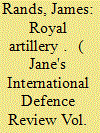

|
|
|
| 9 |
ID:
144183
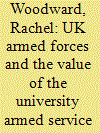

|
|
|
|
|
| Summary/Abstract |
The value of the university armed service units to the UK armed forces is not often subject to scrutiny. Drawing on a research study of the units and their importance to a number of different constituencies, Rachel Woodward, K Neil Jenkings and Alison J Williams assess both the tangible and intangible benefits to the military’s relationship with civil society.
|
|
|
|
|
|
|
|
|
|
|
|
|
|
|
|
| 10 |
ID:
104085
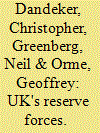

|
|
|
|
|
| Publication |
2011.
|
| Summary/Abstract |
This article focuses on how the role and structure of the UK's Reserve Forces have changed since their foundation before the First World War, with particular attention paid to the last two decades, during which time government has sought to make the Reserves more useable and relevant to post-Cold War military missions, including changing the legislative and administrative basis of their use. Since 9/11, Reserves have played an important role in the defense of the United Kingdom, particularly in operations in Afghanistan and Iraq, but the recent financial crisis has spurred further consideration of how best to structure and use this capability, which has been included as part of the recent Strategic Defence and Security Review (SDSR). The article analyses the current debate on whether the number of Reserve Forces should be cut or increased, and on how best to integrate their efforts with those of the Regular Forces. It also considers the evidence on the recent operational experience of Reserve Forces and its impact on a number of personnel issues, including recruitment, retention, and their health and well-being. The differences between the health and well-being outcomes for Reserve and Regular Forces are discussed and future lines of research enquiry highlighted, while the implications for the comparative analysis of Reserve Forces are also drawn out.
|
|
|
|
|
|
|
|
|
|
|
|
|
|
|
|
|
|
|
|
|